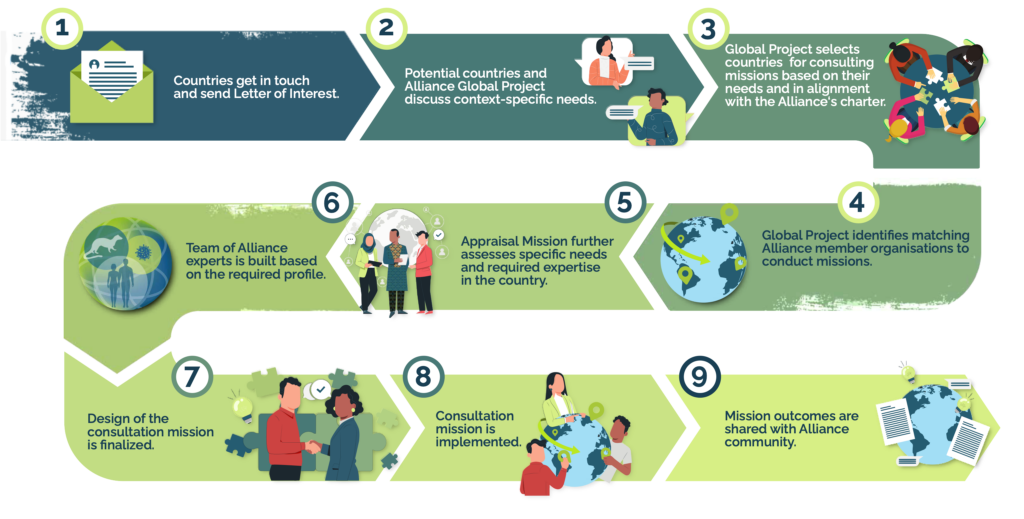As a country rich in biodiversity and wildlife – how do you deal with pandemic prevention?
Context
As we are moving out of the most imminent threats from Covid-19, each country is grappling with the longer-term consequences of this pandemic, including taking care to prevent similar health emergencies in the future. About 700.000 unknown viruses in wild mammals and birds are estimated to have the potential to jump over to humans. Thus, preventing spillover events at the source, i.e. before zoonotic pathogens spill over from wildlife to humans, is of such importance to avoid future local outbreaks, national endemics and global pandemics. Pre-spillover prevention encompasses looking into driving factors including ecosystem disturbance, human-wildlife conflict, and wildlife exploitation, which all can increase the risk for spillover events. Recognizing that working together for preventing disease spillover is of critical importance, we, the International Alliance against Health Risks in Wildlife Trade, help translate the commitment, knowledge and political will of our diverse (180+) member organisations and individual experts into impact by facilitating exchange of knowledge and experience, helping to design countermeasures, and supporting and evaluating interventions.
Our focus is on finding solutions that work context-specifically while concurrently improving health, equity, and well-being for all species – through a One Health approach.
What we offer
The Consultation Facility provides context-specific multidisciplinary consultancy services from Alliance experts to governments/governmental institutions in countries with a high risk of novel diseases of zoonotic origin to prevent spill-over infections – focussing on proactive, primary prevention measures.
About the Consultation Facility
- Along the entire contact trade chain, the expertise within our Alliance is used to put together interdisciplinary teams for tailor-made advice in line with specific country needs to support governments on primary prevention measures and interventions at the wildlife-human interface.
- The Facility is unique in specialising in medium-term, preventive and context-specific government advisory services with concrete results in the context of health risks in wildlife trade and consumption.
- In addition, our Facility can be an accelerator for further activities and engagement of governments, national experts and stakeholders involved in the wildlife-human interface within identified “hotspot” regions or contexts.
What you can expect
Tailor-made context-specific Consultation Services
To drive actual changes on the ground we listen, co-design and advise; we encourage and empower evidence-based orientation and regulation.
By offering guidance to involved government authorities, we can foster transformation and help to improve policy implementation, towards a safer future.
To you, as governmental agency, ministry or other relevant structure, we offer consultancy support which is customized to your specific needs within your country, as part of a participatory process:
- By helping you identity specific drivers for pandemic risk in your country (in particular risks for emerging zoonoses) from contact with wildlife and handling wildlife and wildlife products,
- bringing you together with experts/actors from our network for longer period collaboration,
- offering technical expertise and input in tackling specific questions, including on the ground consulting with you on specific questions and challenges.
This may include the following activities as well as others:
- Analysing the current wildlife trade; mapping traded species and the pathogens and disease they may carry, including seasonal risk patterns
- Identifying and understanding critical control points for risk reduction along the wildlife trade chain: mapping/analysis of stakeholders and their interests and behavioural patterns; work with focus groups on “knowledge, attitude, practices” on social and economic factors of trading and dealing with wildlife
- Identifying appropriate, realistic interventions/alternatives towards risk reduction and formulating concrete recommendations what to change and how
- Facilitating inter-institutional contact and exchange between relevant ministries and government agencies (incl. health/public health; veterinary health,agricultures/livestock, forest, environment) towards establishing joint activities, data pooling and national/international partnerships
- Coordinating targeted risk reduction measures and their monitoring
- Supporting alignment with international agreements
- Providing tailor-made support for changes in processes and structures for risk reduction, including topics of budget and mandate allocation within relevant (governmental) structures
- Counselling on risks and behavioural prevention measures in dealing with wildlife and wildlife consumption (hygiene/bio-security/bio-safety/occupational safety/food safety etc.)
- Developing recommendations for regulation and legislation, more effective enforcement and international cooperation, including demand reduction
How does our Consultation Facility work?

- Countries interested in our specific consultation support get in touch with us, give us first insight into their particular needs and start to get into conversation with us. As part of this initial process, a Letter of Interest is submitted by a governmental body to the GIZ Global Project currently hosting the Alliance Secretariat.
- The Global Project facilitates detailed exchange with the potential countries…
- …and selects countries for consulting missions based on their needs and the alignment with the Alliance’s charter. The selection process is supported by a temporary Alliance Technical Advisory Group (TAG) comprising 6 Alliance members with each seat representing a region (Asia; South East Asia; 2x Africa – South + East/North + West – South America; Central/North America)
- Matching executing Alliance member organisations are identified by the TAG.
- An Appraisal Mission is conducted in the country to further specify and understand specific needs and expertise.
- Consultancy opportunities are shared with all Alliance members and based on the mission design and required profile, a team of Alliance experts is contracted from the membership.
- The consultation mission design is finalised…
- …the mission is implemented in the country starting in 2024…
- …and outcomes are shared with the Alliance community.
Get in touch
If you think that our specific consultation support is exactly what you need for your country, please get in touch with us.